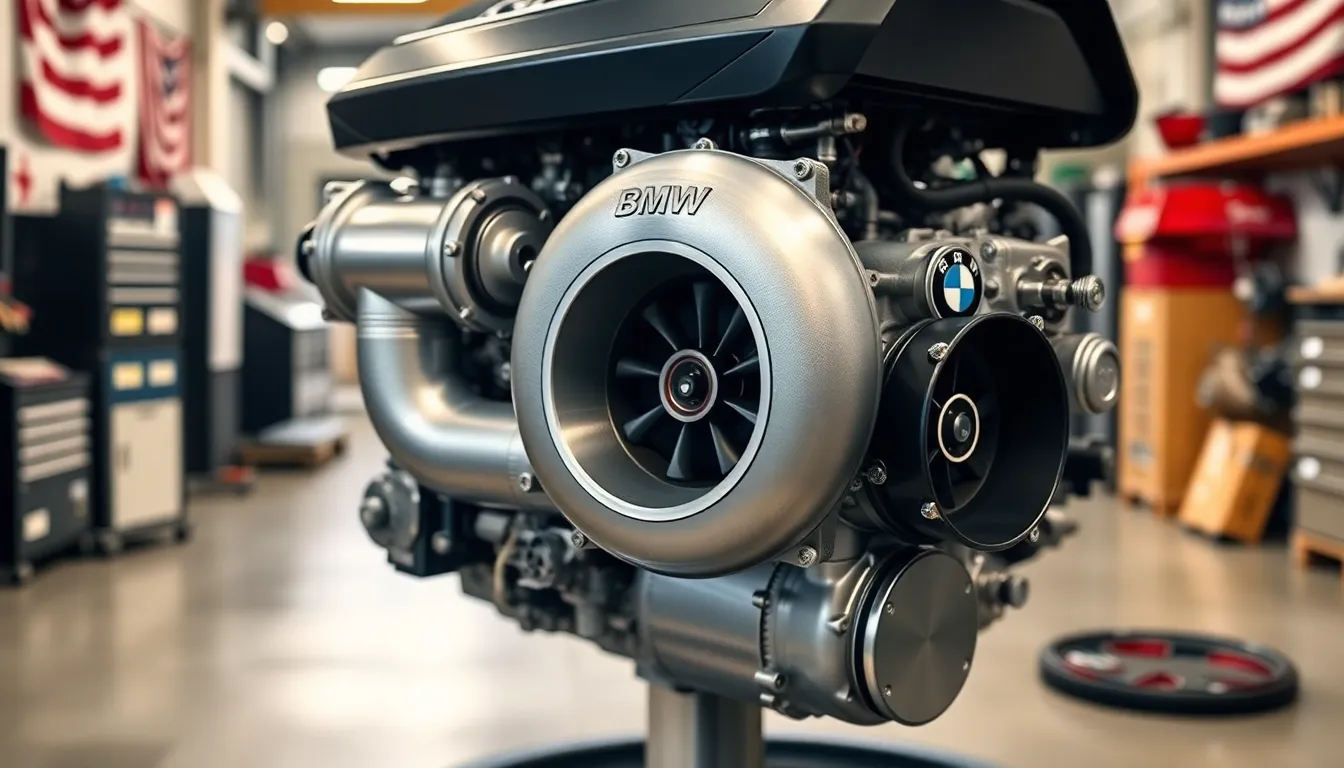Table of Contents
ToggleIn the world of high-performance engines, the BMW B58 stands out like a unicorn at a horse race. Known affectionately as “carlsb58,” this powerhouse has captured the hearts of enthusiasts and tuners alike. With its impressive blend of power, efficiency, and tuning potential, it’s no wonder that carlsb58 has become the go-to choice for those looking to elevate their driving experience to exhilarating heights.
Imagine cruising down the highway, the wind in your hair, and your B58 engine purring like a contented cat. Whether it’s the thrill of a weekend track day or the daily grind to work, this engine delivers a punch that leaves competitors in the dust. Dive into the world of carlsb58, where performance meets personality, and discover why this engine is the secret sauce behind so many unforgettable rides.
Overview of Carlsb58
Carlsb58 refers to the BMW B58 engine, known for its remarkable performance and tuning capabilities. This inline-six engine features a turbocharger, delivering a potent mix of horsepower and torque that appeals to driving enthusiasts. Its design incorporates a twin-scroll turbocharger, which enhances throttle response and reduces turbo lag.
Engineers designed the B58 to balance power and efficiency, making it suitable for both high-performance driving and daily use. The engine produces between 322 and 473 horsepower, depending on the model. This broad power range ensures satisfying acceleration in various driving conditions.
Tuning potential stands out as a key feature of the B58. Many aftermarket upgrades exist, allowing enthusiasts to enhance engine performance significantly. Popular modifications include upgraded intercoolers, exhaust systems, and software tuning. Such enhancements often increase horsepower to over 500, showcasing the engine’s versatility.
The driving experience with the carlsb58 captivates enthusiasts. Its smooth power delivery, combined with refined handling, creates an engaging atmosphere whether on the track or navigating city streets. Additionally, its reliability has gained recognition, with many owners reporting minimal issues even after extensive modifications.
Overall, the carlsb58 engine represents an exceptional choice for those pursuing exciting performance and tuning options. Its blend of innovation, efficiency, and capability solidifies its status in the automotive world. Enthusiasts continue to explore its potential, cementing the B58 as a hallmark of modern engineering excellence.
Features of Carlsb58

The BMW B58 engine, known as “carlsb58,” showcases exceptional features that appeal to automotive enthusiasts and tuners.
Performance
Performance stands out as a defining quality of the B58 engine. Producing between 322 and 473 horsepower, it offers impressive acceleration in diverse conditions. The twin-scroll turbocharger enhances power delivery, ensuring smooth and responsive acceleration. Drivers enjoy its robust torque that peaks around 369 lb-ft, making overtaking easy and effortless. It’s common for tuners to push its limits, often exceeding 500 horsepower with the right modifications. Enhanced tuning capabilities enable the B58 to adapt to various power needs, delivering thrilling experiences whether on the road or the racetrack.
Durability
Durability characterizes the B58 engine, setting it apart from many competitors. Engineered with high-quality materials, it withstands stress even at elevated power levels. Many owners report reliability following extensive modifications, highlighting the engine’s solid construction. Routine maintenance requirements remain manageable, allowing for prolonged engine life. Cast iron and aluminum components contribute to its robust design, while advanced cooling systems prevent overheating during strenuous use. This combination of engineering excellence fosters confidence among drivers, knowing their “carlsb58” will endure the rigors of both daily driving and extreme performance applications.
Comparison with Competitors
Carlsb58 positions itself prominently within the competitive landscape of high-performance engines. The BMW B58 engine’s power output ranges from 322 to 473 horsepower, placing it in direct competition with notable rivals such as the Mercedes-Benz M256 and the Nissan RB26DETT. Both competitors deliver impressive performance metrics, but the B58’s blend of tuning potential and reliability sets it apart.
While the M256 engine offers smooth operation and innovative technology, its power output tends to hover around 362 horsepower in standard configurations. In contrast, BMW’s B58 excels with its higher ceiling of up to 473 horsepower, giving it an advantage in performance applications. Additionally, Nissan’s RB26DETT, a legendary inline-six known for its robustness, often requires extensive modifications to reach similar power levels as the B58.
Tuning communities favor carlsb58 for myriad aftermarket options that enable significant enhancements, frequently pushing horsepower beyond 500. Many tuners appreciate the ease of modifications with the B58 due to its engineering. Conversely, modifications for the M256 and RB26DETT can lead to complexities, impacting reliability over time.
Performance-wise, torque figures also favor the B58, peaking at 369 lb-ft. This torque delivers impressive acceleration, ideal for both everyday driving and track scenarios. While the M256 provides ample torque, it rarely matches the B58’s responsiveness during critical driving moments.
Engine durability further emphasizes carlsb58’s strengths, characterized by high-quality materials, ensuring it withstands elevated stress levels. Many B58 owners report minimal issues even post-modifications, showcasing its long-term viability compared to competitors. Therefore, considering all metrics, the BMW B58 engine remains a formidable choice for enthusiasts seeking excitement and dependability in performance.
Benefits of Using Carlsb58
Carlsb58 offers several advantages that enhance the driving experience. Performance stands out with a power range from 322 to 473 horsepower, providing exhilarating acceleration for various driving conditions. Visibly, the inline-six configuration contributes to smooth power delivery, making it enjoyable whether on the track or in daily commutes.
Durability plays a crucial role in its appeal. Built with high-quality materials, the B58 withstands the stress of modifications while maintaining reliability. Reports from owners indicate minimal issues even after extensive tuning. Reliability complements ease of maintenance, allowing drivers to focus more on performance and less on upkeep.
Tuning potential adds another layer of benefit. Multiple aftermarket options exist to push horsepower beyond 500, appealing to tuners who love customization. Engaging with this diverse community of enthusiasts fosters knowledge sharing about performance upgrades and modifications.
Efficiency impresses as well. The twin-scroll turbocharger not only amplifies power but also optimizes fuel consumption, striking a balance that many performance engines lack. Torque peaks around 369 lb-ft, facilitating effortless overtaking and enhancing overall driving confidence.
Lastly, comparing Carlsb58 with competitors substantiates its strengths. While engines like the Mercedes-Benz M256 and Nissan RB26DETT offer unique characteristics, the B58 often surpasses them in power and reliability. The B58’s superior tuning options and capability differentiate it from others, solidifying its status as a leading choice among high-performance engines.
Potential Drawbacks
Though the BMW B58 engine, known as “carlsb58,” boasts impressive performance, certain drawbacks warrant attention. Some owners report fuel consumption that significantly increases during spirited driving. While the twin-scroll turbocharger enhances acceleration, the added complexity can lead to higher repair costs if issues arise.
Reliability has been a highlight for many, yet some users experience turbo lag during low RPMs, impacting responsiveness. Tuning potential, although extensive, sometimes requires in-depth mechanical knowledge, deterring novice enthusiasts from maximizing performance. Original factory settings may also cause dissatisfaction among drivers seeking a more aggressive driving experience.
In terms of aftermarket modifications, changes might void warranties, posing risks for those who prioritize manufacturer coverage. Comparisons with competitors validate the B58’s strengths, but engines like the Mercedes-Benz M256 and Nissan RB26DETT might offer simpler tuning options. Owners aiming for extreme horsepower should consider the potential for increased wear on engine components with significant modifications.
Routine maintenance remains manageable; however, specialized services may be required for more complex repairs. Heating issues can arise under strenuous conditions despite advanced cooling systems, leading to concerns during high-performance use. Understanding these elements helps prospective buyers weigh their options within the high-performance engine market.
The BMW B58 engine stands out as a remarkable achievement in automotive engineering. Its blend of power efficiency and tuning potential makes it a favorite among enthusiasts seeking performance without sacrificing reliability. With its impressive horsepower range and smooth acceleration, the B58 offers a thrilling driving experience whether on the track or during everyday journeys.
While some challenges exist such as increased fuel consumption and potential turbo lag, the overall package remains compelling. The B58’s strong aftermarket support and robust build quality further enhance its appeal. As car enthusiasts continue to explore its capabilities, the B58 solidifies its reputation as a premier choice in the high-performance engine landscape.







